Top Systems Integration Services in 2025 | Boost Your Business
- Matthew Amann
- May 28, 2025
- 22 min read
Navigating the Landscape of Systems Integration in 2025
Siloed systems create bottlenecks. This listicle provides eight leading systems integration services to help solve this problem. Discover which of these top providers—from established giants like IBM Global Services and Accenture to up-and-coming innovators like Flow Genius—best suits your needs. Whether you’re a roofing contractor streamlining project management or a technology company automating software ecosystems, this list helps you navigate the complexities of choosing the right systems integration services in 2025. We’ll cover Flow Genius, Accenture, IBM Global Services, Deloitte Consulting, Cognizant Technology Solutions, Infosys Limited, Wipro Limited, and Capgemini.
1. Flow Genius
Drowning in manual processes? Struggling to keep up with the competition? Flow Genius offers a lifeline for businesses bogged down by inefficient workflows. As a premier smart automation consultancy, Flow Genius specializes in systems integration services that streamline operations and unlock growth potential. They don’t just connect systems; they craft bespoke automation solutions tailored to your specific business needs and industry nuances. Whether you're in infrastructure, technology, energy, logistics, construction, or commercial cleaning, Flow Genius designs and implements automations that optimize resource allocation, enhance supply chain visibility, improve data analysis, and strengthen client engagement.
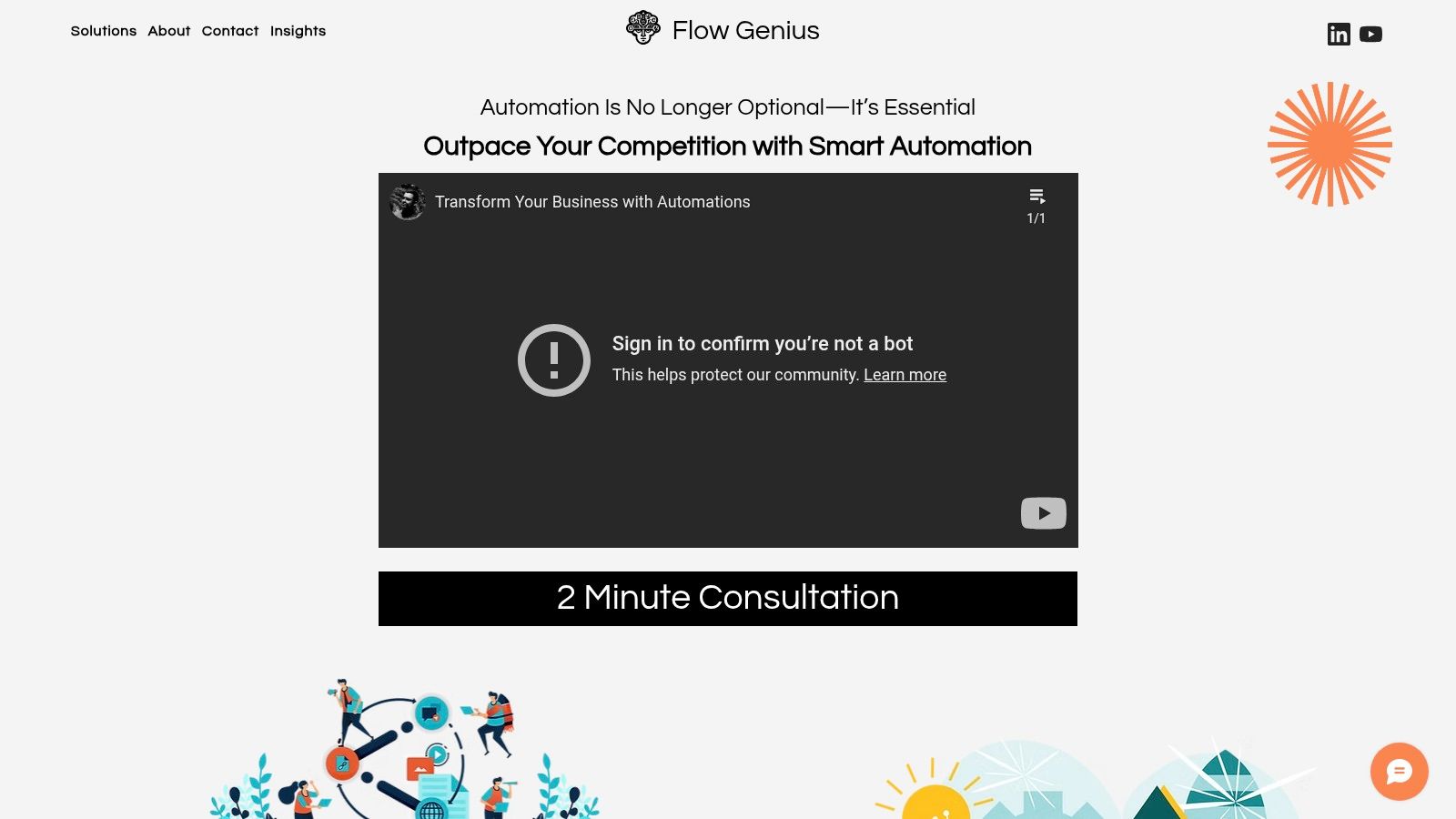
Imagine a roofing contractor struggling to coordinate material deliveries, manage crew schedules, and track project progress. With Flow Genius, they can automate these tasks, eliminating manual data entry, minimizing errors, and freeing up valuable time to focus on core business activities. Similarly, real estate brokers can automate client outreach, property listing updates, and document management, leading to increased efficiency and a more responsive client experience. For technology companies, Flow Genius can integrate disparate software ecosystems, automating data transfer, testing processes, and deployment workflows.
Flow Genius’s comprehensive approach begins with a thorough consultation to pinpoint efficiency gaps and understand your unique business objectives. They then develop a tailored automation blueprint that leverages tools like Zapier, custom scripts, and a variety of software integrations. Their expertise extends across various industries, ensuring that the solutions they build align precisely with your sector's specific challenges and opportunities. For instance, in the energy sector, Flow Genius can automate resource management processes, optimize energy distribution, and enhance predictive maintenance, resulting in significant cost savings and improved operational efficiency. Logistics and supply chain directors can leverage Flow Genius's systems integration services to achieve seamless tracking, automated inventory management, and optimized delivery routes. Even commercial cleaning businesses can benefit, automating scheduling, supply management, and client communication.
Learn more about Flow Genius and how they approach modernizing legacy systems. This resource provides valuable insights into the strategies and benefits of system integration.
Flow Genius's services go beyond simple automation. Their Data Advisory service transforms raw data into actionable insights, empowering organizations to make data-driven decisions and maintain a competitive edge. This is particularly beneficial for companies grappling with large datasets and seeking to uncover hidden patterns and trends. Think of a logistics company wanting to optimize delivery routes based on real-time traffic data and weather patterns. Flow Genius can integrate these data sources and develop algorithms that dynamically adjust routes for maximum efficiency.
The hands-on implementation and rigorous testing conducted by Flow Genius ensure seamless integration into your existing operations. They provide ongoing support and training, empowering your team to manage and adapt the automated workflows as your business evolves. Client testimonials highlight significant increases in productivity and efficiency, validating Flow Genius's transformative impact on workflows. Users of platforms like Zapier, Make.com, and n8n seeking more tailored and complex automations will find Flow Genius a valuable partner.
While Flow Genius offers a compelling proposition, there are a few considerations. Pricing is not publicly available, requiring a personalized quote. This is understandable given the customized nature of their services. Furthermore, because Flow Genius focuses on tailored solutions, the onboarding process may be longer compared to off-the-shelf automation tools. However, this investment in upfront planning and customization ensures a solution perfectly aligned with your unique needs.
For businesses serious about optimizing their workflows and achieving sustainable growth, Flow Genius provides a valuable partner in systems integration. Their tailored solutions, deep industry expertise, and data-driven approach offer a significant advantage in today's competitive landscape. If you're tired of manual processes holding you back, consider contacting Flow Genius for a free consultation and discover how they can unlock your business's full potential. Whether you need to streamline your CRM workflows, automate outbound communication, or synchronize complex logistics, Flow Genius offers the expertise and personalized service to help you achieve your automation goals and outpace the competition.
2. Accenture
Accenture stands as a global powerhouse in professional services, offering a comprehensive suite of systems integration services designed to help organizations of all sizes, from Fortune 500 companies to smaller enterprises, transform their technology infrastructure and streamline business processes. Their extensive reach, encompassing over 700,000 employees worldwide, combined with deep industry-specific expertise and cutting-edge technology capabilities, allows them to deliver end-to-end integration solutions. These solutions span a wide range of crucial areas, including cloud computing, data analytics, digital transformation, and robust security measures. This breadth of services makes them a compelling choice for businesses seeking a single partner to manage complex integration projects.
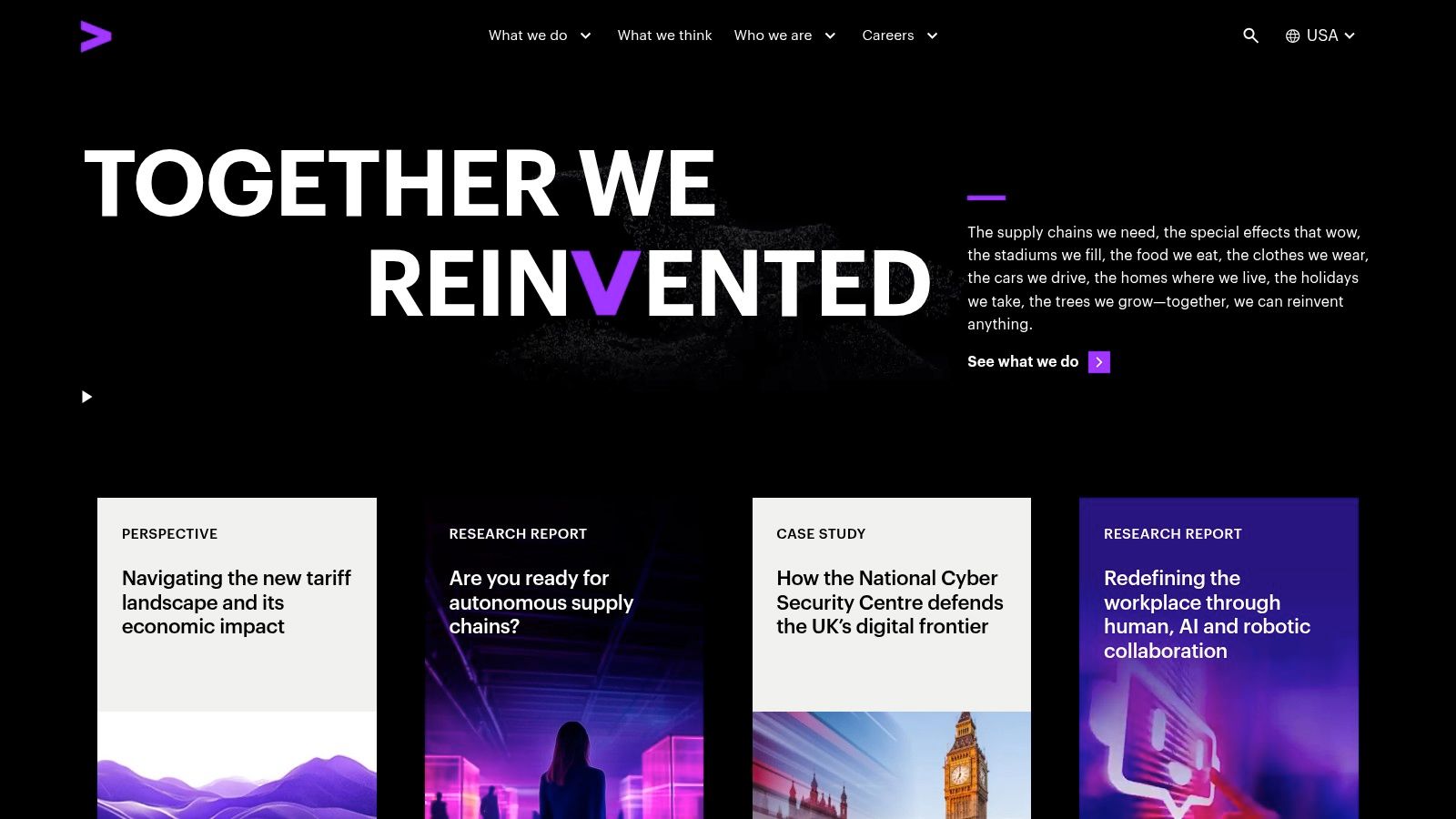
Accenture’s systems integration services are particularly relevant to businesses focused on modernizing their operations and leveraging technology for competitive advantage. For example, infrastructure project managers struggling with fragmented logistics and communication can benefit from Accenture’s expertise in integrating disparate systems for seamless project execution. Technology companies aiming to integrate and automate their software ecosystems can leverage Accenture’s experience in API management and enterprise application integration (EAI). In the energy sector, operations teams focused on optimizing resource management can utilize Accenture's advanced analytics and AI-powered integration platforms to gain real-time insights and improve decision-making. Logistics and supply chain directors seeking seamless tracking and workflow optimization can leverage Accenture’s industry-specific solutions to streamline operations and improve efficiency. Even businesses in sectors like commercial cleaning, roofing, and real estate can benefit from Accenture's ability to automate tasks such as scheduling, supply management, and client outreach. This broad applicability is a key factor in Accenture's prominent position in the systems integration landscape.
Accenture’s key features include cloud migration and hybrid cloud integration services, catering to the growing trend of cloud adoption. Their expertise in EAI and API management enables businesses to connect different applications and systems, fostering data flow and process automation. For organizations grappling with legacy systems, Accenture offers modernization and digital transformation services to help them transition to more agile and efficient technology platforms. Furthermore, their industry-specific solutions, tailored for sectors like finance, healthcare, retail, and manufacturing, demonstrate a deep understanding of unique business challenges and requirements. Finally, their investment in advanced analytics and AI-powered integration platforms positions them at the forefront of intelligent automation.
While Accenture offers a robust suite of services and global reach, it's crucial to consider both the pros and cons. On the plus side, their extensive global presence, coupled with deep industry expertise, provides clients with access to a vast pool of talent and specialized knowledge. Their comprehensive service portfolio, covering virtually all aspects of systems integration, allows for a one-stop-shop approach. Strong partnerships with major technology vendors like Microsoft, SAP, Oracle, and AWS ensure seamless integration with existing and emerging technologies. A proven track record with Fortune 500 companies provides assurance of their capabilities and experience in handling complex, large-scale projects.
However, Accenture's premium pricing structure can be a significant barrier for smaller organizations with limited budgets. Their complex organizational structure can sometimes lead to slower decision-making processes. Additionally, their reliance on external consultants, while providing specialized expertise, can create a dependency that may not be ideal for organizations seeking to build internal integration capabilities.
Implementing a systems integration project with Accenture typically involves an initial consultation phase to assess the client's specific needs and objectives. This is followed by a detailed planning phase where the scope of the project, timelines, and resources are defined. The implementation phase involves the actual integration of systems, which can include data migration, application development, and testing. Post-implementation, Accenture provides ongoing support and maintenance services to ensure the smooth operation of the integrated systems. While specific technical requirements vary depending on the project, Accenture generally works with a wide range of technologies and platforms, adapting to the client's existing infrastructure. Unfortunately, detailed pricing information is not publicly available and is typically determined on a project-by-project basis. For more information, you can visit their website at https://www.accenture.com. Understanding these factors is crucial for organizations considering Accenture as their systems integration partner.
3. IBM Global Services
IBM Global Services stands as a prominent player in the systems integration services arena, leveraging IBM's vast technology portfolio, including Watson AI, Red Hat, and hybrid cloud solutions. They offer comprehensive end-to-end integration services designed to help organizations modernize IT infrastructure, connect disparate systems, and accelerate digital transformation journeys. This makes them a compelling option for businesses seeking robust and scalable integration solutions, particularly those already invested in the IBM ecosystem.
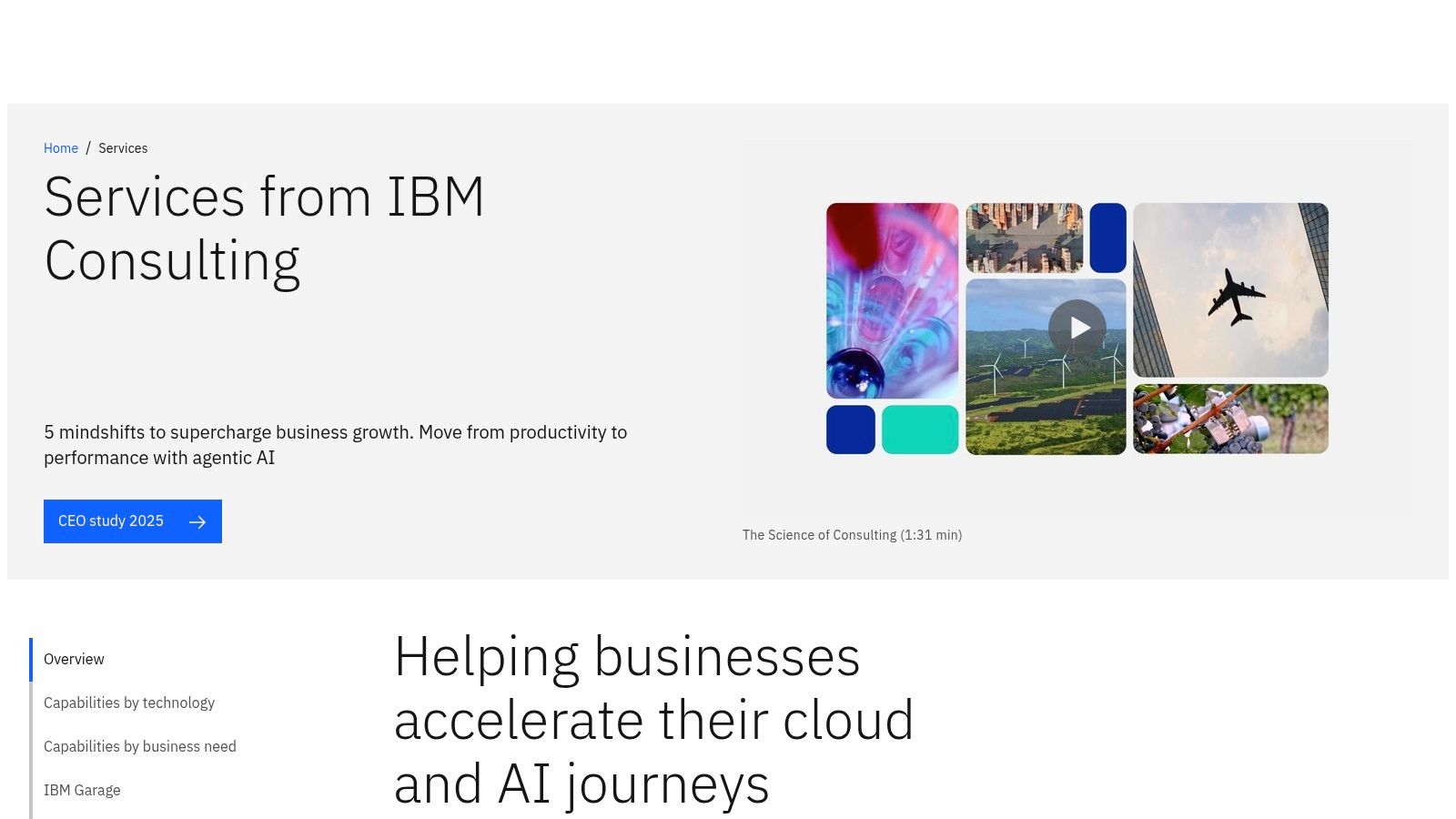
IBM Global Services caters to a diverse range of integration needs, offering solutions tailored for specific industries, from finance and healthcare to manufacturing and retail. Practical applications span several crucial areas:
Hybrid Cloud Integration: Using the Red Hat OpenShift platform, IBM enables seamless integration between on-premises systems and various cloud environments. This is particularly relevant for organizations adopting a hybrid cloud strategy, allowing them to manage and orchestrate workloads across different platforms. For example, a logistics company could integrate its existing warehouse management system with a cloud-based transportation management system, creating a unified logistics platform.
AI-Powered Integration: Leveraging Watson AI, IBM brings intelligent automation to integration processes. This can include automating data mapping, identifying integration errors, and optimizing workflows. For instance, a real estate broker could use AI-powered integration to automatically populate property listings across multiple platforms, saving time and reducing manual effort.
Legacy System Modernization: IBM has extensive experience in modernizing mainframe and legacy systems. This is critical for organizations looking to update outdated technology without disrupting existing business processes. For example, a bank could modernize its core banking system by integrating it with modern digital banking platforms, providing customers with a seamless omnichannel experience.
Industry-Specific Solutions: IBM offers pre-built integration accelerators and solutions tailored for specific industries. This allows organizations to leverage industry best practices and accelerate their integration projects. For example, an energy company could use a pre-built solution to integrate its smart grid systems, enabling real-time monitoring and optimization of energy distribution.
Security-Focused Integration: With a strong emphasis on security, IBM utilizes its security technologies to ensure data integrity and compliance throughout the integration process. This is paramount for organizations handling sensitive data, such as healthcare providers or financial institutions.
Features and Benefits:
The key features of IBM Global Services include hybrid cloud integration with Red Hat OpenShift, AI-powered integrations using Watson, mainframe modernization capabilities, industry-specific accelerators, and a security-first approach. These features translate into tangible benefits such as improved operational efficiency, enhanced agility, reduced IT costs, and increased innovation.
Pros and Cons:
While IBM Global Services offers a powerful suite of integration capabilities, it is important to consider both the advantages and disadvantages:
Pros:
Deep technical expertise in enterprise-grade systems.
Robust proprietary technology stack including AI and quantum computing.
Extensive experience with complex, mission-critical integrations.
Comprehensive security and compliance capabilities.
Cons:
Can be complex and expensive for smaller implementations. Pricing is typically based on the complexity and scope of the project and involves consulting fees, software licenses, and ongoing support.
A strong focus on IBM technologies might limit vendor-neutral solutions.
Implementation timelines can be lengthy for complex projects.
Implementation and Setup:
Implementing IBM Global Services typically involves a phased approach, including assessment, design, development, testing, deployment, and ongoing support. IBM provides consulting services to guide organizations through the implementation process. Technical requirements vary depending on the specific integration needs, but generally involve compatible hardware and software infrastructure, network connectivity, and skilled IT personnel.
Comparison with Similar Tools:
While IBM offers a comprehensive suite of services, alternatives like Deloitte, Accenture, and Capgemini also provide systems integration services. These alternatives may offer different pricing models, technology stacks, and industry specializations. Organizations should carefully evaluate their specific needs and compare different providers before making a decision.
Conclusion:
IBM Global Services is a powerful choice for organizations seeking comprehensive systems integration services, particularly those already leveraging IBM technologies. Its strengths lie in its deep technical expertise, robust technology stack, and experience with complex integrations. However, organizations should carefully consider the potential drawbacks, such as cost and implementation complexity, before embarking on a project. For more detailed information and to explore specific solutions, visit https://www.ibm.com/services.
4. Deloitte Consulting
Deloitte Consulting holds a prominent position among providers of systems integration services, distinguishing itself by tightly coupling business consulting with technological expertise. For organizations seeking not just system integration but a holistic transformation aligned with business strategy, Deloitte offers a compelling, albeit premium, solution. Their services span a broad range of needs, including cloud integration, enterprise application integration, and digital transformation initiatives. This makes them a viable option for a diverse range of clients, from infrastructure project managers seeking synchronized logistics to business brokers automating outreach.
One of Deloitte’s key strengths lies in its business-driven approach to systems integration. Unlike purely technical integrators, Deloitte emphasizes aligning technology implementations with overarching strategic goals. This is particularly valuable for clients undertaking large-scale digital transformations, ERP implementations, or customer experience platform integrations. For example, an energy sector operations team looking to optimize resource management wouldn’t simply receive a technically sound integration; they'd also receive strategic guidance on how that integration can support broader efficiency and sustainability goals. Similarly, logistics and supply chain directors seeking seamless tracking and workflow can leverage Deloitte’s expertise to ensure the chosen systems integrate seamlessly with existing processes and future expansion plans. Even commercial cleaning businesses looking to automate scheduling and supply management could benefit from Deloitte's strategic consulting layered on top of technical integration.
Deloitte’s "cloud-first" integration approach, leveraging platforms like AWS, Azure, and Google Cloud, resonates with modern businesses seeking scalability and flexibility. This is a crucial factor for technology companies integrating and automating their software ecosystems. Deloitte's proficiency in data and analytics platform integration also empowers data-driven decision-making, an increasingly essential requirement for businesses across all sectors, from roofing contractors to real estate brokers. Their extensive experience in enterprise resource planning (ERP) integration and implementation is particularly relevant for companies experiencing rapid growth or undergoing mergers and acquisitions, facilitating the consolidation and streamlining of business processes.
While Deloitte's comprehensive approach provides significant advantages, it's essential to consider the potential drawbacks. As one of the Big Four consulting firms, Deloitte’s services come at a premium price point. This high-cost structure may be prohibitive for smaller businesses or those with straightforward integration needs. There’s also the risk of over-engineered solutions, where a simpler, more cost-effective approach might suffice. Furthermore, Deloitte’s popularity and high demand can sometimes lead to challenges in resource availability, potentially impacting project timelines. Companies should carefully weigh these factors against the benefits before engaging their services.
Comparison with Similar Tools: While other systems integration service providers exist, such as Accenture, IBM, and smaller niche players, Deloitte differentiates itself through its deep industry knowledge across multiple sectors. This allows them to offer tailored solutions specific to industry nuances and regulatory requirements. For example, their understanding of the energy sector allows them to deliver systems integration services that address the unique challenges of that industry. This industry-specific expertise sets them apart from more generalist integration providers.
Implementation and Setup Tips: When engaging with Deloitte, clients should clearly articulate their business objectives and desired outcomes from the systems integration project. Open communication and collaboration throughout the project lifecycle are critical. Establishing clear metrics for success and regularly reviewing progress will help ensure the project stays on track and delivers the expected value. Because of Deloitte’s broad service offering, clients should carefully scope the project to avoid unnecessary complexity and cost.
Pricing and Technical Requirements: Deloitte’s pricing model typically involves a combination of fixed fees and time and materials, depending on the project's scope and complexity. Technical requirements vary depending on the specific systems being integrated. A thorough assessment of existing infrastructure and systems is typically conducted during the initial consultation phase.
Who Benefits Most from Deloitte’s Services? Deloitte’s systems integration services are best suited for large enterprises and organizations undertaking complex, business-critical integrations. Those seeking strategic alignment of technology with business goals will benefit most from their expertise. While smaller businesses can also leverage their services, they should carefully evaluate the cost-benefit ratio. For users of automation platforms like Make.com, Zapier, or n8n, Deloitte’s services might be excessive unless they’re part of a larger enterprise-level integration initiative. However, for companies seeking to scale their automation efforts and integrate them with complex enterprise systems, Deloitte’s expertise could be invaluable. Ultimately, businesses looking for a comprehensive approach to systems integration, combining deep technical expertise with strategic business consulting, will find Deloitte to be a strong contender. Visit Deloitte Consulting to explore their services further.
5. Cognizant Technology Solutions
Cognizant Technology Solutions is a multinational information technology company providing a wide array of services, including prominent expertise in systems integration services. They focus heavily on digital transformation and modernization, making them a suitable partner for businesses seeking to upgrade their existing infrastructure and incorporate cutting-edge technologies. Cognizant distinguishes itself by offering cost-effective solutions, achieved through leveraging offshore delivery capabilities, automation, and specialized industry knowledge. This allows them to effectively bridge the gap between legacy systems and modern cloud and digital platforms, catering to the diverse needs of their clientele. Their client base spans a wide range of industries including healthcare, financial services, retail, logistics, and more, making their services applicable to a broad market of businesses seeking systems integration services.
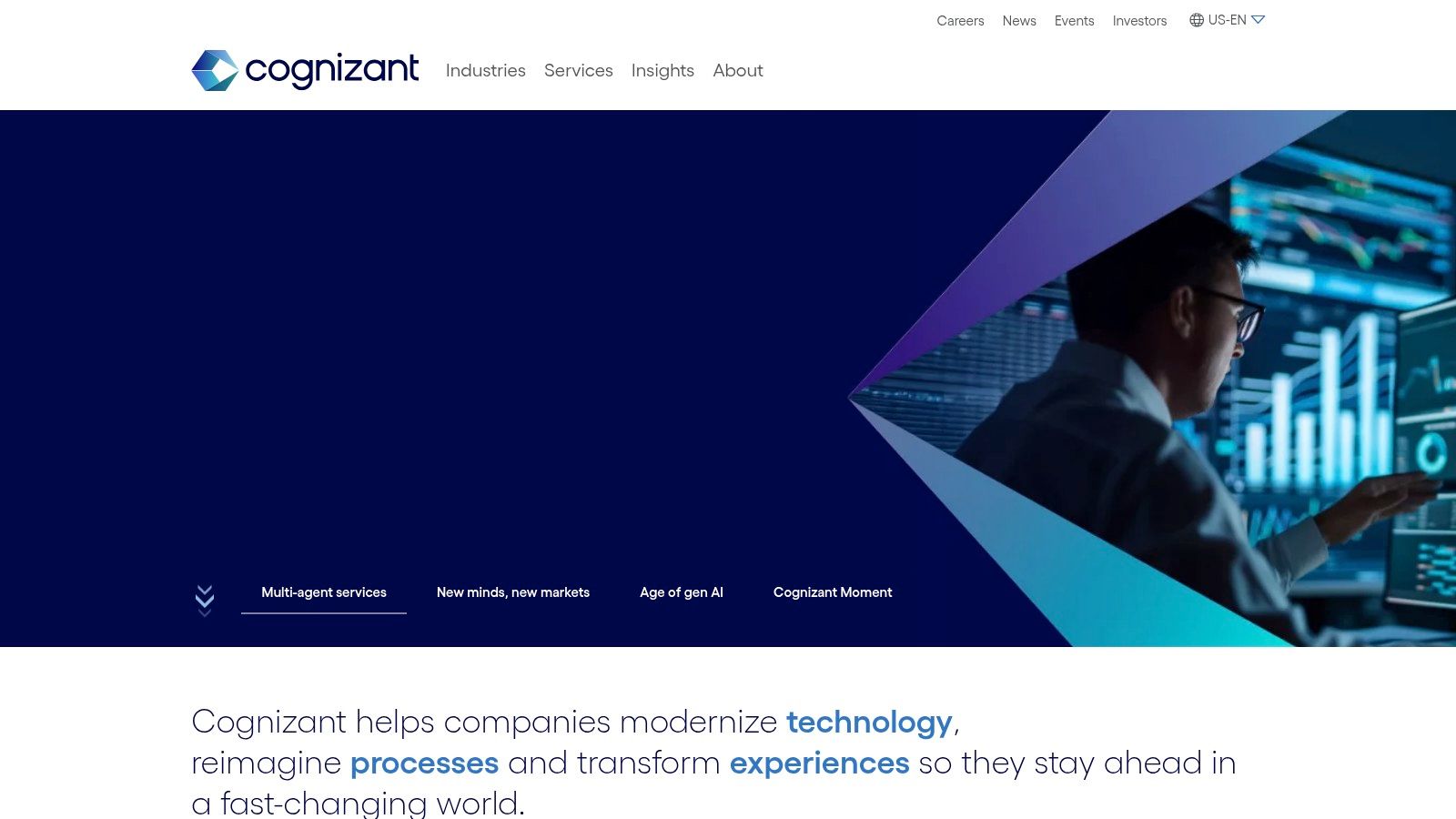
Cognizant’s strength lies in its ability to deliver comprehensive systems integration services across various sectors. For instance, in the healthcare industry, they can integrate disparate systems like electronic health records (EHR), patient portals, and billing systems to create a unified and efficient platform. This streamlines operations, improves patient care, and reduces administrative overhead. In the financial services sector, they can integrate core banking systems with trading platforms and risk management tools, enabling real-time data analysis and informed decision-making. Retailers can leverage Cognizant's services to integrate their online and offline channels, creating a seamless omnichannel experience for their customers. Even sectors like energy, logistics, commercial cleaning, and real estate can benefit from streamlined workflows and automated processes through customized system integrations. This is particularly useful for infrastructure project managers requiring synchronized logistics and communication, and logistics and supply chain directors seeking seamless tracking and workflow optimization.
From a technical standpoint, Cognizant employs several key features that contribute to its effectiveness in systems integration. These include automated systems integration using AI and machine learning, which significantly reduces manual effort and accelerates the integration process. They utilize industry-specific integration frameworks, offering pre-built solutions and accelerators that expedite implementation and reduce time-to-market. Their adoption of cloud-native integration platforms and microservices architecture ensures scalability, flexibility, and resilience. An API-first integration strategy with comprehensive API management facilitates seamless connectivity between different systems. Finally, their agile and DevOps-enabled integration delivery methodologies promote rapid iteration and continuous improvement.
While Cognizant offers numerous advantages, including competitive pricing through its offshore delivery model and strong automation capabilities, there are some potential drawbacks to consider. Communication challenges can sometimes arise due to distributed global teams, requiring clear communication protocols and diligent project management. Compared to traditional consulting giants, Cognizant may have less brand recognition, though their extensive experience and successful track record speak for themselves. Finally, clients might need to be more involved in project management compared to projects with companies that handle more in-house. Understanding these potential challenges beforehand can help clients effectively manage expectations and collaborate effectively with Cognizant's teams.
Learn more about Cognizant Technology Solutions as it relates to overcoming common data integration hurdles. This further highlights their focus on staying ahead of the curve in a constantly evolving technological landscape. For companies looking for systems integration services, understanding these challenges is crucial for successful project implementation. Cognizant's expertise in navigating these challenges reinforces their value proposition for businesses seeking reliable and effective integration solutions. Their services are especially relevant for technology companies aiming to integrate and automate their software ecosystems, as well as Make.com, Zapier, and n8n users looking for enterprise-grade solutions. By leveraging Cognizant’s systems integration expertise, businesses can streamline operations, enhance efficiency, and drive digital transformation. While specific pricing and technical requirements are generally tailored to individual project needs and not publicly listed, Cognizant’s focus on cost-effectiveness through automation and offshore capabilities positions them as a viable option for businesses looking to optimize their IT budgets.
6. Infosys Limited
Infosys Limited stands as a global powerhouse in the realm of technology services and consulting, offering a comprehensive suite of systems integration services. Their approach leverages advanced digital platforms and AI-powered solutions, making them a compelling choice for businesses seeking robust and future-proof integration capabilities. Infosys specializes in tackling large-scale enterprise integrations, cloud transformations, and modernizing legacy systems, all with a keen focus on automation and innovation. This commitment to cutting-edge technologies makes them particularly attractive to organizations aiming to streamline operations and embrace digital transformation. Their target demographic spans a wide range, from infrastructure project managers seeking streamlined logistics and communication to technology companies aiming to integrate and automate their software ecosystems. Even niche sectors like energy, logistics, and commercial cleaning can benefit from Infosys' solutions.
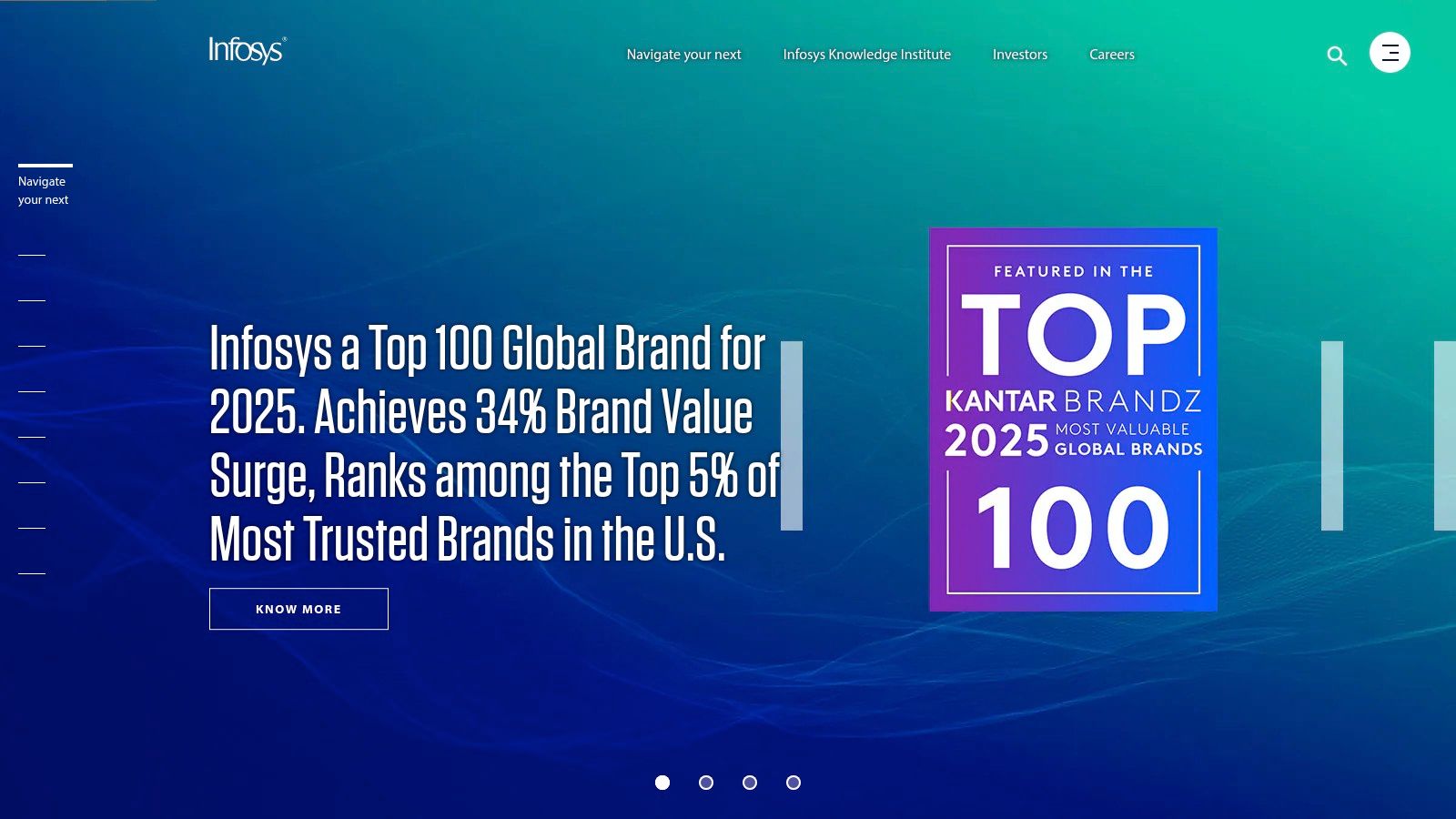
Infosys's strength lies in its ability to deliver seamless integration across diverse systems. Their Infosys Cobalt cloud integration platform, boasting over 35,000 assets, serves as a cornerstone of their offering. This platform, coupled with AI-powered testing and validation tools, accelerates the integration process and ensures robust performance. Whether you're working with SAP, Oracle, or Microsoft ecosystems, Infosys provides enterprise application integration capabilities tailored to your specific needs. Furthermore, their industry-specific solutions and accelerators demonstrate a deep understanding of various sectors, offering pre-built components that can significantly reduce implementation time and costs.
One of the key differentiators of Infosys is its "Zero-distance delivery model." This approach strategically combines onshore and offshore capabilities, allowing them to offer highly cost-effective solutions while maintaining a global reach. This model benefits clients by providing access to a larger pool of talent and resources, while also potentially mitigating some of the challenges associated with purely offshore models. This is a significant advantage for companies looking to balance cost-efficiency with responsiveness and collaboration.
For infrastructure project managers, Infosys's systems integration services can synchronize logistics and communication workflows, improving overall project efficiency. Technology companies can leverage Infosys to integrate and automate their software ecosystems, fostering scalability and agility. In the energy sector, Infosys can help optimize resource management and improve operational efficiency. Logistics and supply chain directors can benefit from seamless tracking and workflow integration, while commercial cleaning businesses can automate scheduling and supply management. Even real estate and business brokers can leverage Infosys’s capabilities to automate outreach and client relationship management. This broad applicability highlights Infosys's versatility as a systems integration provider.
While Infosys presents a strong case for businesses seeking comprehensive integration solutions, it's important to consider potential drawbacks. Time zone differences can sometimes impact real-time collaboration, and cultural and communication barriers may arise in certain regions. While the focus on efficiency is generally a positive attribute, it can occasionally lead to compromises on customization needs. It is crucial to thoroughly assess your specific requirements and communicate them clearly to the Infosys team to ensure a successful implementation.
Unfortunately, specific pricing and technical requirements for Infosys's systems integration services are not readily available publicly. Potential clients are encouraged to contact Infosys directly for detailed quotes and technical specifications tailored to their individual projects. This personalized approach allows Infosys to understand the nuances of each project and provide a customized solution.
Despite these minor drawbacks, Infosys's strong proprietary platforms, cost-effectiveness, and expertise in emerging technologies like AI, IoT, and blockchain make them a compelling choice for businesses seeking robust systems integration services. Their proven track record with large-scale, complex integrations solidifies their position as a leader in the field. For more information, you can visit their website at https://www.infosys.com. Their commitment to innovation and customer-centric approach makes them a valuable partner for businesses navigating the complexities of digital transformation.
7. Wipro Limited
Wipro Limited stands as a prominent global information technology player, carving a niche for itself in delivering robust systems integration services. Their offerings place a strong emphasis on digital transformation and cloud-first strategies, making them an attractive choice for organizations seeking to modernize their operations in today's rapidly evolving technological landscape. Wipro provides comprehensive integration solutions that seamlessly blend traditional IT services with cutting-edge technologies like AI, RPA, and API management, empowering businesses to enhance operational efficiency and unlock new growth opportunities. This approach makes them particularly relevant for businesses across various sectors, including technology, energy, logistics, and real estate, all of whom stand to benefit from streamlined workflows and data-driven insights.
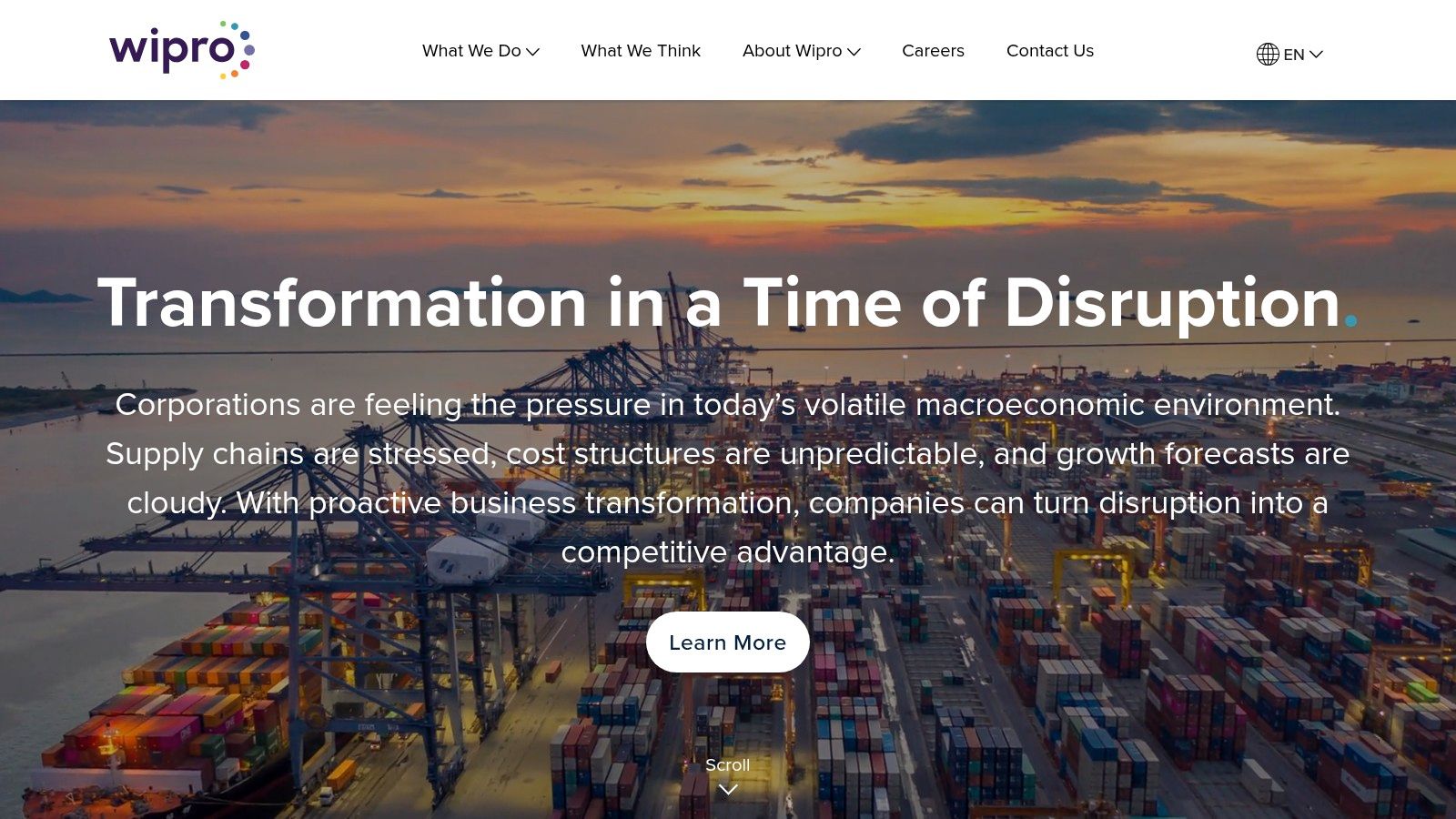
Wipro's commitment to a cloud-first integration strategy across diverse multi-cloud environments allows organizations to leverage the scalability and flexibility of the cloud, optimizing infrastructure costs and enhancing agility. This resonates strongly with infrastructure project managers seeking to streamline logistics and communication through centralized cloud platforms. Their industry-specific integration platforms, tailored for sectors like banking, healthcare, and manufacturing, provide targeted solutions that address the unique challenges and regulatory requirements of these industries. For instance, in healthcare, Wipro's integration services can facilitate seamless data exchange between different healthcare systems, improving patient care and operational efficiency. Similarly, in manufacturing, their solutions can integrate shop floor systems with enterprise resource planning (ERP) systems, enabling real-time visibility into production processes and enhancing supply chain management. This focus on industry-specific solutions makes them a valuable partner for companies operating in these complex sectors.
Furthermore, Wipro's adoption of intelligent automation using Robotic Process Automation (RPA) and Artificial Intelligence (AI) optimizes integration processes by automating repetitive tasks and enabling intelligent decision-making. Think of a logistics and supply chain director leveraging Wipro’s services to automate inventory management or a commercial cleaning business owner streamlining scheduling and supply procurement through automated workflows. These capabilities directly benefit users of automation platforms like Zapier, Make.com, and n8n who are looking for robust integration solutions to further enhance their automation strategies. Wipro's emphasis on API economy enablement, through comprehensive API management solutions, empowers businesses to create connected experiences and unlock new revenue streams. This is crucial for technology companies aiming to integrate and automate their software ecosystems and extend their services to partners and customers through APIs.
One of Wipro’s key strengths lies in its focus on sustainable and responsible technology solutions, aligning with growing environmental, social, and governance (ESG) concerns. Their sustainability-focused integration solutions support organizational ESG goals, a particularly attractive proposition for companies prioritizing environmentally conscious operations. While specific pricing information isn't readily available publicly, Wipro offers competitive pricing with flexible engagement models tailored to different client needs and project scopes. Potential clients should engage directly with Wipro to discuss their specific requirements and obtain detailed pricing information.
However, Wipro is not without its limitations. Compared to top-tier consulting giants, their scale is smaller, and their presence is limited in certain geographic markets. Furthermore, establishing strong relationships for more complex engagements may require a longer lead time.
Implementing Wipro's systems integration services requires a collaborative approach, beginning with a thorough assessment of existing systems and business needs. Clear communication and ongoing collaboration between Wipro's team and the client's stakeholders are essential for successful implementation. While specific technical requirements vary based on individual project needs, generally, clients need robust IT infrastructure, including network connectivity, data storage, and security protocols, to support the integration process.
In conclusion, Wipro Limited offers a compelling suite of systems integration services, particularly attractive for organizations pursuing digital transformation and cloud-first strategies. Their focus on industry-specific solutions, intelligent automation, and sustainability, combined with competitive pricing, positions them as a strong contender in the systems integration market. While factors like smaller scale and limited geographic presence should be considered, Wipro’s strengths and capabilities justify its place on this list, especially for businesses prioritizing innovation, efficiency, and sustainable technology solutions. You can explore their offerings further on their website: https://www.wipro.com
8. Capgemini
Capgemini stands as a prominent player in the systems integration services landscape, offering a comprehensive suite of consulting, technology, and digital transformation services. Their focus on "Intelligent Industry" solutions distinguishes them, leveraging deep sector-specific expertise combined with cutting-edge technology to deliver seamless integration across hybrid IT environments. This approach makes them a compelling choice for businesses seeking to accelerate their digital transformation journey and optimize operational efficiency. They cater to a wide range of industries, from manufacturing and industrial operations to energy, logistics, and even commercial real estate, making them a versatile option for diverse integration needs.

Capgemini's strength lies in its ability to bridge the gap between business consulting and technical implementation. This is particularly beneficial for organizations grappling with complex integration projects requiring both strategic guidance and robust technical execution. For instance, a logistics company looking to implement a real-time tracking system across its entire supply chain could leverage Capgemini's expertise in both logistics optimization and systems integration to achieve a seamless and efficient deployment. Similarly, an energy company seeking to optimize resource management could benefit from Capgemini’s Intelligent Industry X.0 solutions tailored for the energy sector, integrating diverse data sources and systems for improved decision-making. Even businesses like roofing contractors or commercial cleaning companies seeking to automate scheduling and supply management through systems integration can find tailored solutions through Capgemini's broad service offerings.
Their Intelligent Industry X.0 solutions leverage cloud-native integration platforms with containerized architectures, enabling flexible and scalable deployments. The focus on data and analytics integration across enterprise data ecosystems is crucial for businesses seeking to gain actionable insights from their data. This is especially relevant for data-driven decision-making in areas like supply chain management, customer relationship management (CRM), and predictive maintenance. You might want to learn more about Capgemini and their approach to data integration. Capgemini’s dedication to sustainability and ESG-focused integration solutions also aligns with the growing emphasis on environmentally responsible business practices.
For those exploring proof-of-concept development and tailored solutions, Capgemini’s Applied Innovation Exchange labs provide a valuable resource. These labs allow businesses to experiment with new technologies and integration approaches in a controlled environment, mitigating risks and ensuring a smoother transition to full-scale implementation. This can be particularly advantageous for technology companies aiming to integrate and automate their software ecosystems, offering a sandbox for testing and refinement before deployment.
While Capgemini offers a robust set of systems integration services, understanding the associated pricing and technical requirements is essential. Their pricing tends to be higher compared to Indian service providers, reflecting their focus on high-end consulting and complex implementations. This makes them a suitable choice for large enterprises with complex integration needs and the budget to accommodate premium services. However, smaller businesses or those with limited budgets might find the pricing prohibitive. Technical requirements vary depending on the specific project, but often involve expertise in cloud platforms, containerization technologies, and data integration tools.
Compared to industry giants like IBM and Accenture, Capgemini has a smaller market presence, though their influence is growing, particularly in North American markets. This growth trajectory indicates a commitment to expansion and investment in these regions, making them a reliable partner for businesses operating in these areas. However, their smaller size might translate into limited availability for urgent or short-term projects. Businesses with tight deadlines should consider this factor when evaluating potential integration partners.
Capgemini’s commitment to innovation, evident in their dedicated research and development centers, sets them apart in the systems integration landscape. Their focus on intelligent industry solutions, combined with their expertise in cloud-native integration and data analytics, positions them as a valuable partner for businesses seeking to navigate the complexities of digital transformation. While cost considerations and potential availability limitations are factors to consider, Capgemini’s strengths in innovation, business consulting, and technical implementation make them a worthy contender for businesses seeking comprehensive systems integration services. From automating workflows for real estate brokers to optimizing resource management for energy sector operations, Capgemini provides tailored solutions across a broad spectrum of industries and business needs. For users familiar with workflow automation platforms like Zapier, Make.com (formerly Integromat), or n8n, Capgemini can offer enterprise-grade solutions tailored to complex integration challenges.
Top 8 Systems Integration Providers Comparison
Company | Core Features/Capabilities | User Experience & Quality ★ | Value Proposition & Pricing 💰 | Target Audience 👥 | Unique Selling Points ✨ |
|---|---|---|---|---|---|
🏆 Flow Genius | Customized workflow automations, data advisory | ★★★★★ Personalized, hands-on implementation | Contact for quote; high customization | Infrastructure, tech, energy, logistics | Tailored + data insights + end-to-end service |
Accenture | Cloud, API mgmt, legacy modernization | ★★★★ Large scale, global expertise | Premium pricing | Fortune 500, global enterprises | Strong vendor partnerships + broad services |
IBM Global Services | Watson AI, Red Hat hybrid cloud, security-first integration | ★★★★ Deep tech stack, security focus | Expensive for small projects | Large enterprises with complex IT needs | AI & quantum tech + mission-critical integrations |
Deloitte Consulting | Strategic consulting, cloud, ERP, customer experience | ★★★★ Business-tech alignment, change management | High cost, premium consulting | Enterprises needing strategy & tech synergy | Business-driven integration + transformation |
Cognizant Technology | AI automation, cloud-native, API-first | ★★★★ Agile, automation-focused | Competitive; offshore delivery | Digital transformation clients | Automation + agile delivery + cost-efficient |
Infosys Limited | Infosys Cobalt cloud, AI testing, ERP integration | ★★★★ Proprietary platforms + AI tools | Cost-effective global delivery | Large-scale complex integrations | Strong platforms + emerging tech expertise |
Wipro Limited | Cloud-first, RPA/AI automation, ESG-focused | ★★★ Balanced innovation and practical approach | Competitive, flexible models | Multiple verticals, sustainable tech focus | Sustainability + intelligent automation |
Capgemini | Industry X.0, cloud-native, data analytics integration | ★★★★ Innovation labs + business-consulting balance | Higher pricing, less urgent project focus | Manufacturing, industrial, digital business | Innovation focus + ESG integration expertise |
Making the Right Choice for Your Business
Choosing the right systems integration services is paramount for streamlining operations, boosting efficiency, and ultimately driving growth. From the robust capabilities of established players like Accenture, IBM, Deloitte, Cognizant, Infosys, Wipro, and Capgemini, to the innovative automation solutions offered by platforms like Flow Genius, the options available cater to a diverse range of needs and budgets. Remember, the most effective solution depends on your specific business requirements, whether you're in infrastructure project management, software development, energy, logistics, or even commercial cleaning. This article highlighted key considerations such as industry expertise, integration approach, and the provider's support infrastructure – all crucial factors for a successful implementation.
When choosing a systems integration partner, consider the specific technologies and frameworks that align with your project needs. For robust and scalable web solutions, explore specialized providers like Laravel web development services which can be seamlessly integrated into a broader systems strategy. Furthermore, consider the complexity of your current systems, your scalability goals, and your internal IT resources when making this important decision. Careful planning and the right partner will empower you to leverage the full potential of systems integration.
Successfully integrating your systems can transform your business, enabling seamless data flow, enhanced communication, and automated workflows. For a powerful, no-code solution that empowers you to connect and automate various systems, explore Flow Genius. Flow Genius offers a user-friendly platform to build custom integrations, freeing up your team to focus on strategic initiatives. Discover how Flow Genius can simplify your systems integration journey today.